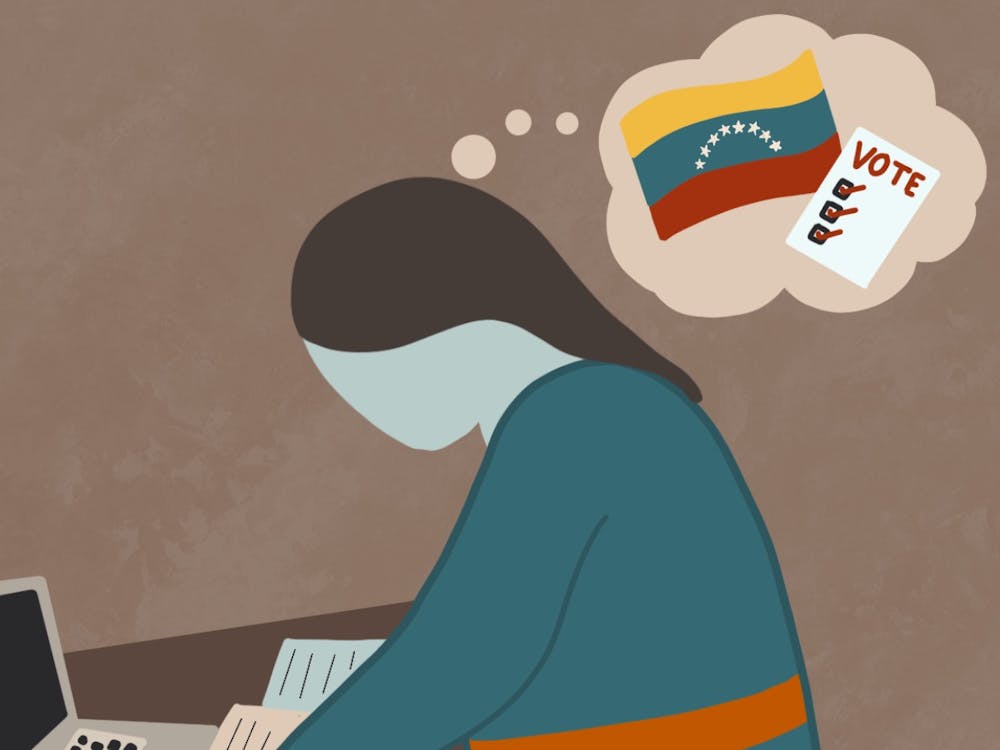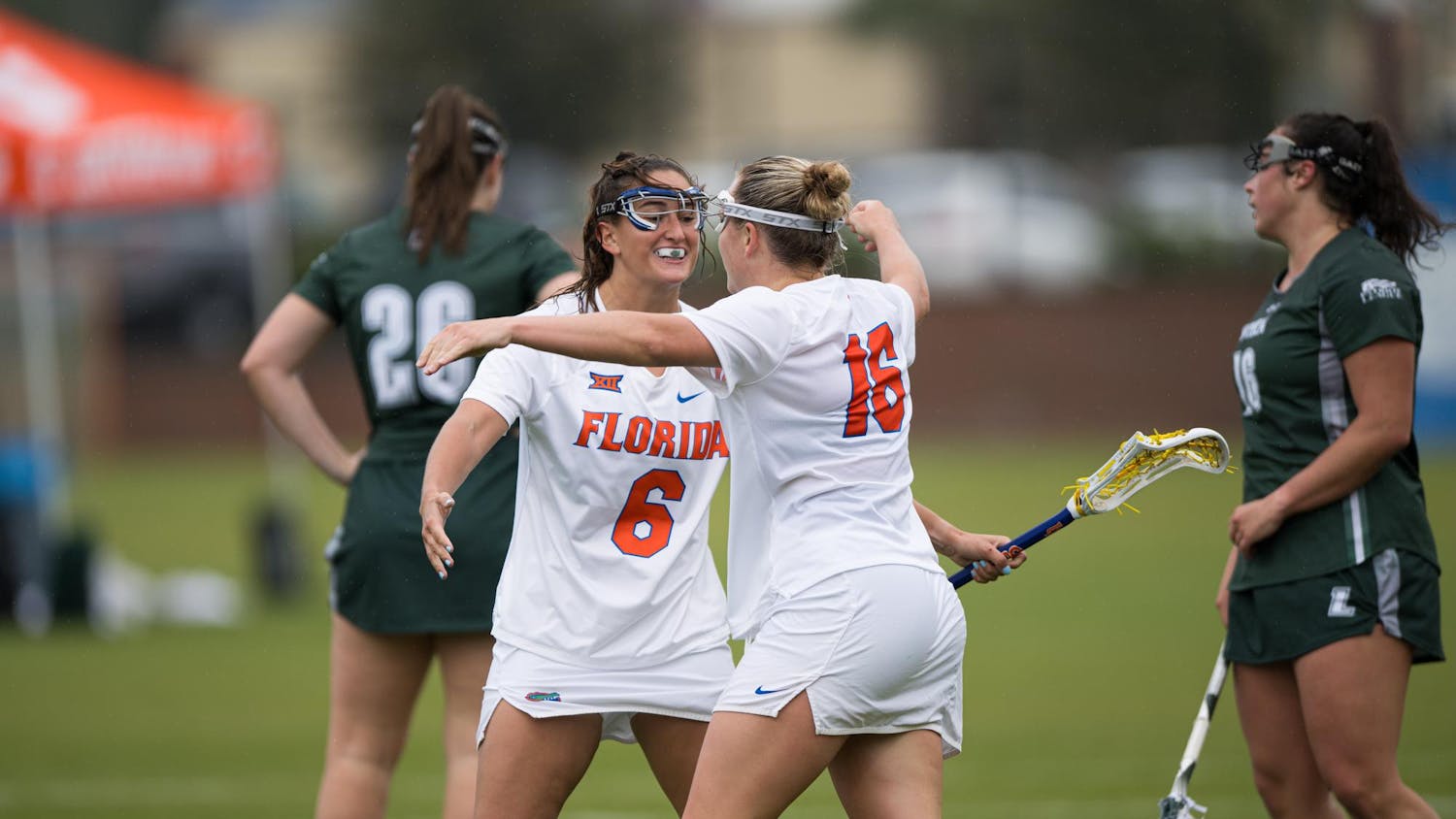Protestors filled the streets of Caracas, Venezuela, lifting posters calling for “libertad” in anticipation of the results of the country’s 2024 presidential election. More than 1,300 miles away, Ismary Ochoa anxiously watched the news in Miami.
Thirty minutes before the National Electoral Council (CNE) announced the results the night of July 28, tears flooded from Ochoa’s eyes as she waited with her family, who moved from Venezuela to Miami in 2015 after political violence in the country reached a “breaking point.” The fear of Nicolás Maduro’s regime continuing to force other families to make the impossible choice to leave their culture behind consumed her.
The opposition party which ran against Maduro included the Venezuelan opposition leader Maria Corina Machado and presidential candidate Edmundo González Urrutia. Though Maduro’s administration banned Machado from running as a presidential candidate, she continued to stay in the race as a spokesperson for González.
“Ever since Chavez died and Maduro was placed into leadership… the people knew that this wasn’t their democracy anymore,” Ochoa said. “There was a different tone to the conversation this time around, especially with the new leaders of the opposing Venezuelan party.”
Ochoa and other Venezuelans’ hope for a change in power was washed away when the CNE announced Maduro as the victor, ushering in his third term.
Further controversy erupted following the CNE’s call when Machado announced the opposing party had been tallying votes for the election that showed González won more than 6 million votes and Maduro won 2.7 million votes. In response to the evidence, countries like the United States, Peru and Argentina have recognized Gonzalez as president-elect of Venezuela.
Carlos Casanova, a UF visiting faculty fellow specializing in philosophy, is no stranger to the controversial elections in Venezuela, having left the country in 2002 in fear for his safety.
“It's all fraud,” Casanova said. “There have [been] no elections in Venezuela since 2000.”
Casanova said he was not surprised Maduro claimed he won. He was surprised, he said, by the amount of “ads” his friends in Venezuela were getting, declaring González as the winner.
Despite the disappointment and frustration those like Casanova felt following the election, Machado and González’s campaign continues to inspire and instill hope in Venezuelan people, including Jose Peaguva, a 21-year-old UF biomedical engineering senior.
When Peaguva was 15, his family moved from Venezuela to the United States after state police tried to break into his mother’s car while she was driving home during a protest. Though his family was already thinking about moving out of the country for the sake of his and his sister’s opportunities, he said the attempted break-in was the last straw.
Like many Venezuelans, he wanted a change in the government, but because Maduro's administration is notoriously corrupt and fraudulent, Peaguva said he didn’t expect it to enforce fair elections.
“On the last weeks before the election, people were really getting excited,” Peaguva said. “We were motivated. We wanted to make history, and we wanted to take out this dictatorship that has been like this for more than 25 years in our country.”
The night Maduro was declared the winner of the election, Peaguva “was devastated.” He said he was further frustrated by conflicting media coverage of results, with different outlets separately calling the election for González and Maduro.
Like Peaguva, Emiliana Tadconi wants to support the people struggling in Venezuela.
Tadconi, a 21-year-old UF political science junior, transferred last year and immediately joined the Venezuelan Student Association (VENSA) as the director of marketing. Now vice president of outreach, she raises funds to support the Venezuelan population and finds organizations in the country that will distribute the aid.
“It's been a little rough because I'm trying to find organizations that are not related to the [Venezuelan] government at all,” Tadconi said.
Under Maduro, Venezuela’s inflation rate became the highest in the world, reaching 1,800,000% in 2018. The dire economic conditions have limited the country’s opportunities in higher education, which is why Tadconi is determined to raise funds to support Venezuelan youth.
“You couldn’t even go into a supermarket,” Tadconi said. “It was basically empty, and if you found even an apple, it would be extremely expensive.”
Tadconi left Venezuela in November 2017 at the height of the student-led protests over the Maduro-ruled Supreme Court trying to usurp the authority of the legislative branch. Over 100 protestors were killed by police or accidents.
Being able to move to the United States was a “huge privilege,” but others had not been as fortunate to have an escape plan, Tadconi said.
Other Venezuelans like Camila Rodriguez, a 20-year-old UF political science junior, also hope that Maduro’s alleged victory will draw further international attention to Venezuelan politics.
Seeing the same results each election is devastating, but this year there is hope, Rodriguez said.
“I feel like in the past, the elections would happen, and it was like so obviously rigged and just complete fraud,” Rodriguez said. “Then people would just, for a week, go out in the streets, protesting…the Venezuelan people can only do so much. It gets to a point where other government officials need to intervene to take down this government, so it does feel different this time for sure.”
While many countries have come forward in supporting González as president, Maduro and his government have urged protests and demonstrations to halt, while simultaneously blaming the opposing party for inciting violence.
"I hold you, González, responsible for everything that is happening in Venezuela: the criminal violence, the delinquents, the injuries, the deaths and the destruction. You are directly responsible as are you Machado, and there has to be justice," Maduro said July 30 during a rally.
Machado marched with protesters and supporters Aug. 3 in Caracas stating, “Just as it took us a long time to achieve electoral victory, now comes a stage that we take day by day, but we have never been as strong as today, never.”
Contact Kamala Rossi at krossi@alligator.org. Follow her on X @kamalarossi.
Kamala Rossi is a fourth-year journalism major and the Santa Fe reporter for The Alligator. When she's not writing, Kamala can be found surfing, watching movies and reading.






